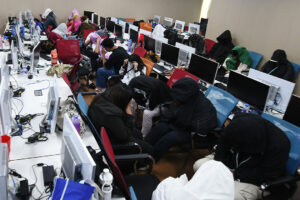OSG urged to probe land titles linked to Chinese
A HOUSE of Representatives quad committee on Monday submitted to the Solicitor General documents detailing how a Chinese national fraudulently acquired Filipino citizenship so he could own land and set up businesses in the Philippines. “These activities are in clear violation of our laws and require immediate executive action,” the House committees on dangerous drugs, […]

A HOUSE of Representatives quad committee on Monday submitted to the Solicitor General documents detailing how a Chinese national fraudulently acquired Filipino citizenship so he could own land and set up businesses in the Philippines.
“These activities are in clear violation of our laws and require immediate executive action,” the House committees on dangerous drugs, public order, human rights and public accounts said in a joint letter to Solicitor General Menardo I. Guevarra.
They urged the top government lawyer to fast-track the review of the documents and start legal action including forfeiture proceedings “given the severe national security implications and the clear violations of legal processes.”
“Several Chinese personalities” bought “thousands of hectares of land,” Surigao del Norte Rep. Robert Ace S. Barbers, who heads the dangerous drugs committee, separately told a news briefing.
Some of the documents sent to the Office of the Solicitor General (OSG) included fake birth certificates, tax declarations, corporate records and land sale deeds tied to a Chinese national.
Government lawyers would review the documents submitted by the House bodies, Assistant Solicitor General Hermes L. Ocampo told the same briefing.
He said they could start legal actions such as forfeiture cases through the Anti-Money Laundering Council, the recovery of illegally acquired real estate. The 1987 Philippine Constitution bars foreigners from owning land.
Properties transferred to Filipino dummies could still be litigated, he said, noting that they could file administrative and criminal cases against the Filipinos.
“We do not have the final figure, but if we base it on the number of titles acquired, whether transferred to the name of the Chinese national or to his registered corporation, it is about 300 to 400 titles,” he said in Filipino.
“We have to expedite all issues pertaining to the properties owned by Chinese individuals pretending to be Filipinos,” Sta. Rosa City Rep. Dan S. Fernandez told the same briefing in mixed English and Filipino.
Mr. Barbers said his committee might craft a bill making the process of acquiring a birth certificate more rigorous. “The requirements for issuing a certificate of live birth need to be strict, especially for those applying under the late registration policy.”
Meanwhile, the Department of Justice (DoJ) said more than 5,000 people employed by Philippine Offshore Gaming Operators (POGO) and internet gaming licensees (IGL) have yet to downgrade their visas to comply with President Ferdinand R. Marcos’ order of a total ban.
“There are many people who have not voluntarily downgraded their visas,” Justice Secretary Jesus Crispin C. Remulla told reporters. “This presents a dilemma for us because it shows that many of them really don’t want to leave the country.”
The visa downgrade allows foreigners to revert their status from a work visa to a temporary visitor visa. In comparison, more than 12,000 foreign workers of discontinued POGOs have applied for the downgrade, the Bureau of Immigration said earlier.
They now hold temporary tourist visas for 59 days, allowing them to stay in the country while winding down their affairs, it added. The deadline for the voluntary visa downgrade was on Oct. 15.
Mr. Remulla said they are automatically downgrading the visas of the more than 5,000 delinquent workers.
The Immigration bureau noted that if a Chinese national employed by an internet gaming licensee fails to apply for a visa downgrade, he will have an “Order to Leave” stamped on his passport, which means he must leave the country immediately.
The foreigner will have a hard time returning to the Philippines.
Philippine Amusement and Gaming Corp. (PAGCOR) Assistant Vice-President Catalino B. Alano, Jr. told BusinessWorld via Viber that 38 of the 41 internet gaming licensees were still winding down their operations.
Mr. Marcos in his state of the nation address to Congress in July ordered the closure of POGOs and IGLs, which he said were linked to crimes including scams and human trafficking. — Kenneth Christiane L. Basilio and Chloe Mari A. Hufana
















